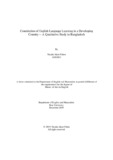Constriction of English language learning in a developing country— a qualitative study in Bangladesh

View/
Date
2019-12Publisher
Brac UniversityAuthor
Fabee, Nazida AkterMetadata
Show full item recordAbstract
The aim of this study is to explore the constriction of students’ English language learning due
to the challenges faced in a developing country, and the study is conducted in the context of
Bangladesh. Eventually, the exploration leads towards understanding how the learning is being
constricted and in what magnitude. Qualitative method was employed to explore the students’
learning experiences of English in Bangladesh which in fact shaped the direction of this study.
The findings suggest, students’ learning of English is being constricted essentially in terms of
their superior cognitive abilities such as critical thinking and creativity which impact
communication skill also. Rote learning and fallen integrity rather appear to be significant
constituents in this process of constriction as the catalyst and/or byproduct. Among few
anticipated measures from the findings, cautions against the students’ tendency to give
minimum effort is the notable one. Hence, findings from this study may aid in the endeavors
of bridging the gap between policy and practice.
Keywords
Constriction; Developing country; Bangladesh; English language; Cognitive; 21st century skillsDescription
This thesis is submitted in partial fulfillment of the requirements for the degree of Master of Arts in English, 2019.Department
Department of English and Humanities, Brac UniversityType
ThesisCollections
- Thesis, M.A. (English) [139]
